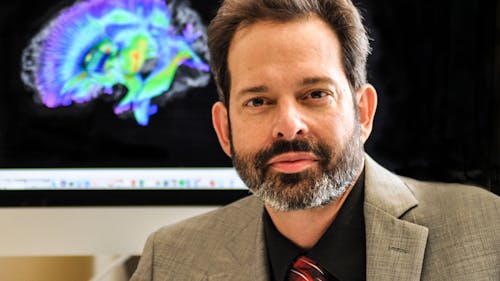Rutgers' new Brain Health Institute director gives interview

The Rutgers Brain Health Institute has appointed Dr. David H. Zald as the director of the new Center for Advanced Human Brain Imaging Research (CAHBIR), which will open its doors in Fall 2020.
“Since I started performing brain imaging experiments as a graduate student, I have been continually excited by the ability of neuroimaging to peer inside the brain,” Zald said. “I want to be able to facilitate that same experience in a research community. Given Rutgers’ commitment to clinical neuroscience, the opportunity to build a center around that mission is really enticing.”
The Brain Health Institute is an overarching organization that supports neuroscience research across all of Rutgers, said Director Gary Aston-Jones. It focuses on four areas of strength: neurodevelopment, neurodegeneration, motivational and affective neuroscience and cognitive and sensory neuroscience.
“David’s center for human brain imaging is a core facility that cuts across many of those four areas because it’s relevant to any kind of brain disorder,” Aston-Jones said. “It’ll be important for all of the activities and research being done at the Brain Health Institute.”
Coming from Vanderbilt University, Zald said he had to adjust to the many Rutgers departments and centers involved in the Brain Health Institute and neuroscience research.
“I will admit that on my first visit to Rutgers related to this position, I struggled a bit in figuring out the structure of the relevant administration that might have an influence on the development of the center. I think my biggest asset here may simply be that I really value transparency and clear communication, which helps in avoiding confusion,” Zald said.
The imaging center is the result of a partnership between both the RBHS and Rutgers—New Brunswick chancellors. RBHS Chancellor Brian L. Strom is footing a $3 million bill for the magnet and building renovations, Jones said, and the Rutgers—New Brunswick Chancellor Christopher J. Molloy is adding $1 million to help researchers collect preliminary data that they can use to write grant applications.
The center, Zald said, will be located in the Staged Research building on Busch campus and will house a 3-Tesla magnetic resonance imaging (MRI) magnet that costs approximately $2 million. The machine, he said, will provide high resolution structural and functional information about the brain.
“David will set this instrument up and get it working properly. He’ll be there to help people who want to do studies in the center,” Aston-Jones said. “Many times in research, because it's research, you see unexpected things. That’s how you make discoveries, but you need an expert like David to know how to interpret something unexpected in the image.”
Zald said he will also use the center’s magnet to conduct his own research on executive function in humans. His background as a researcher, he said, is much different from his new role as director.
“There is a natural tendency when running one’s own lab to focus narrowly on the methods that are most relevant for just your lab’s research questions,” he said. “By contrast, I will now spend far more time listening to and addressing what other labs need. It is a shift in roles, but one that feels quite natural given the role I have often played in advising junior faculty and students in their own research over the years.”
The new center makes conducting brain imaging research easier for faculty, who currently have to use Rutgers’ only scanner in Newark despite having a research and patient base in Piscataway, Aston-Jones said. Rutgers students will also get involved in the cutting-edge neuroscience technology at the imaging center.
“They’ll be able to get their Ph.Ds. doing experiments with the scanner and establish their careers using that kind of technology. Undergraduates will be able to do honors theses using that technology and work with faculty using that technology,” Aston-Jones said.
Zald said he anticipates a number of roles of undergraduate and graduate students at the imaging center and in his own lab. He also hopes to hold workshops for students and allow students to volunteer as subjects in imaging studies, which will let them see pictures of their own brain.
“One of the most rewarding aspects of an academic’s life is being able to mentor students and junior faculty,” he said. “And then to watch them develop as scientists.”
His first goal for the imaging center is to offer state-of-the-art brain MRI for students and faculty to take advantage of. His second goal, he said, is for the center to serve as a catalyst for building a neuroscience community across the different campuses.
“This should allow us to build on the fact that there are already great human neuroscience researchers at Rutgers and should further allow us to better attract future leaders in the field,” Zald said.
The center, Aston-Jones said, will also work closely with the Center for Cognitive Computational Neuropsychiatry (CCNP), which is a collaboration between Rutgers and Princeton University that studies behavioral changes due to brain disorders.
“We’re very fortunate to have Dr. Zald joining the Brain Health Institute and directing the new Center for Advanced Human Brain Imaging,” said Aston-Jones. “If you’re going to be cutting edge in modern neuroscience, you have to be strong in human neuroimaging. This will make us very strong in human neuroimaging.”



